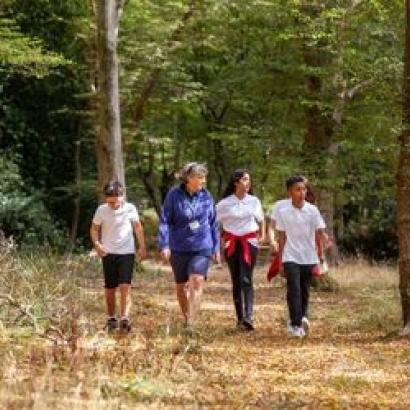
Climate Justice
Day 4: Climate Justice
The average carbon footprint per person in the UK is 12.7 tonnes CO2 equivalent.
The average footprint of someone living in Uganda, East Africa is approximately 0.13 tonnes CO2 equivalent.
The lifestyles of people in wealthier countries, such as the UK, produce much more carbon dioxide meaning these countries have historically contributed more to global warming; and continue to do so today.
Climate change is already affecting different people and places unevenly, and so is leading to inequalities within and across nations, and between current and future generations, leading to greater injustice.
-
Daily Action: Find out your carbon footprint
Daily Action - details & ideasFind out what your personal carbon footprint is by using the WWF Carbon Footprint calculator. The resource below contains a link to the calculator and many more learning ideas.
-
Keynote speakers: Primary school
SALVE International
Keynote supporting resourceStart the day with this insightful keynote video by young Ugandan’s from SALVE International answering questions from Barncroft Primary students. Find out how to join their monthly Inequality Debate.
Use these films 'Climate Justice According to a Kid' (7mins) 'Story of Climate Justice' (2.5mins) to learn more about the theme. Follow up with a discussion or lesson ideas from the resource below. -
Keynote speaker: Secondary schools and colleges
SALVE International
Keynote supporting resourceStart the day with this insightful keynote video by young Ugandan’s from SALVE International answering questions from Barncroft Primary students. Find out how to join their monthly Inequality Debate.
Use this motivating TEDtalk 'Climate Justice Now! How?' to learn more about the theme and follow up with a discussion or lesson ideas from the resource below. -
KS1 & KS2 Resources
Thought Box Equality & Justice Curriculum
Recommended resourceAn Equality & Justice curriculum exploring some of the biggest questions of our time, for Year 1 upwards.
-
KS3 & KS4 resources
Thought Box Equality & Justice Curriculum
Recommended resourceAn Equality & Justice curriculum exploring some of the biggest questions of our time, for Year 1 upwards.
-
Post 16
How Will You Reboot the Future
Recommended resourcesReboot the Future call on all educators of 14-18 year olds to ignite students’ sense of optimism, tap into their imagination and inspire them with positive and personal ways of engaging in climate action. It follows five young people determined to make a difference.
The World is (Y)Ours is a moving 4min film which looks at climate change from the perspective of black and brown people in Britain.
-
Families
Climate Kids
Climate KidsNASA Climate Kids explains the importance of carbon in a child friendly way and provides a lot more activities for the classroom or families.
There are many ways to teach children to take care of the natural world, and one simple yet powerful approach is through books visit the Suntrap Book Club page for recommendations.
-
CPD session
Thursday 11 November 2021 4.00pm - 4.45pm
Click for booking linkWhat is possible? Building momentum for Climate Change Education.
There is growing attention on the need for more thorough education on climate change through the national curriculum and schools can play a pivotal role in nurturing sustainable mindsets for the future.
Suzanne Jeffery, teacher at George Mitchell all through school, and campaigner with Campaign Against Climate Change and the NEU Climate Change Education Network will share what visions for education are being put forward by these organisations and how we can get involved.
Click here to read more about the session.
-
More inspiration: Podcast & Books
How to Save the Planet - Individual Actions or Systemic Change??
Podcast linkDo individual actions matter when it comes to climate change? Or is it all about big, systemic change? This episode of podcast How to Save the Planet breaks down both sides of the argument.
For deeper understanding about climate justice check out this race and climate reading list by Friends of the Earth.


